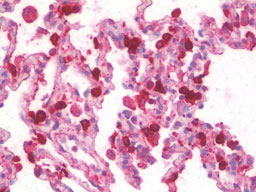SFTPA1 + SFTPA2 Antibody (aa102-115)
Goat Polyclonal Antibody
- SPECIFICATION
- CITATIONS
- PROTOCOLS
- BACKGROUND

Application
| WB, IHC-P, E |
|---|---|
| Primary Accession | Q8IWL2 |
| Reactivity | Human |
| Host | Goat |
| Clonality | Polyclonal |
| Calculated MW | 26242 Da |
| Dilution | ELISA (1:32000), IHC-P (5 µg/ml), WB (0.01-0.03 µg/ml) |
| Gene ID | 653509 |
|---|---|
| Other Names | Pulmonary surfactant-associated protein A1, PSP-A, PSPA, SP-A, SP-A1, 35 kDa pulmonary surfactant-associated protein, Alveolar proteinosis protein, Collectin-4, SFTPA1, COLEC4, PSAP, SFTP1, SFTPA, SFTPA1B |
| Target/Specificity | Human SFTPA1 / Surfactant Protein A. This antibody is expected to recognize all the reported isoforms of A1 (NP_005402.3; NP_001087239.2; NP_001158117.1; NP_001158118.1) and A2 ( NP_001092138.1), Reported variants represent identical protein: NP_001 ... |
| Reconstitution & Storage | Store at -20°C. Minimize freezing and thawing. |
| Precautions | SFTPA1 + SFTPA2 Antibody (aa102-115) is for research use only and not for use in diagnostic or therapeutic procedures. |
| Name | SFTPA1 |
|---|---|
| Synonyms | COLEC4, PSAP, SFTP1, SFTPA, SFTPA1B |
| Function | In presence of calcium ions, it binds to surfactant phospholipids and contributes to lower the surface tension at the air- liquid interface in the alveoli of the mammalian lung and is essential for normal respiration. Enhances the expression of MYO18A/SP-R210 on alveolar macrophages (By similarity). |
| Cellular Location | Secreted. Secreted, extracellular space, extracellular matrix. Secreted, extracellular space, surface film |
| Volume | 50 µl |

Thousands of laboratories across the world have published research that depended on the performance of antibodies from Abcepta to advance their research. Check out links to articles that cite our products in major peer-reviewed journals, organized by research category.
info@abcepta.com, and receive a free "I Love Antibodies" mug.
Provided below are standard protocols that you may find useful for product applications.
If you have used an Abcepta product and would like to share how it has performed, please click on the "Submit Review" button and provide the requested information. Our staff will examine and post your review and contact you if needed.
If you have any additional inquiries please email technical services at tech@abcepta.com.













 Foundational characteristics of cancer include proliferation, angiogenesis, migration, evasion of apoptosis, and cellular immortality. Find key markers for these cellular processes and antibodies to detect them.
Foundational characteristics of cancer include proliferation, angiogenesis, migration, evasion of apoptosis, and cellular immortality. Find key markers for these cellular processes and antibodies to detect them. The SUMOplot™ Analysis Program predicts and scores sumoylation sites in your protein. SUMOylation is a post-translational modification involved in various cellular processes, such as nuclear-cytosolic transport, transcriptional regulation, apoptosis, protein stability, response to stress, and progression through the cell cycle.
The SUMOplot™ Analysis Program predicts and scores sumoylation sites in your protein. SUMOylation is a post-translational modification involved in various cellular processes, such as nuclear-cytosolic transport, transcriptional regulation, apoptosis, protein stability, response to stress, and progression through the cell cycle. The Autophagy Receptor Motif Plotter predicts and scores autophagy receptor binding sites in your protein. Identifying proteins connected to this pathway is critical to understanding the role of autophagy in physiological as well as pathological processes such as development, differentiation, neurodegenerative diseases, stress, infection, and cancer.
The Autophagy Receptor Motif Plotter predicts and scores autophagy receptor binding sites in your protein. Identifying proteins connected to this pathway is critical to understanding the role of autophagy in physiological as well as pathological processes such as development, differentiation, neurodegenerative diseases, stress, infection, and cancer.



